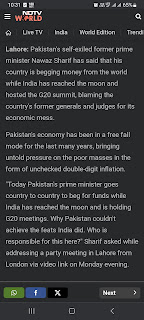No T20 infrastructure, but dreaming of G20? 🤔
Title: "Dreaming Big: The Challenge of Hosting G20 Amidst T20 Limitations"
In the realm of global diplomacy and international cooperation, hosting a G20 summit is considered a significant milestone for any nation. The G20, or Group of Twenty, brings together the world's major economies to discuss pressing global issues, economic policies, and international collaboration. However, the dream of hosting such a high-profile event might seem ambitious, especially for a country that struggles to host a T20 cricket match, let alone manage the complexities of a G20 summit.
The Significance of the G20 Summit
The G20 summit is more than just a gathering of world leaders; it's a platform for crucial discussions that can shape the global economy and address pressing challenges such as climate change, trade, and public health crises. The prestige and responsibility associated with hosting a G20 summit cannot be overstated. It requires a nation to demonstrate exceptional organizational skills, diplomatic finesse, and the ability to handle an influx of dignitaries, security concerns, and media attention.
T20 Matches vs. G20 Summits
Let's compare the logistics and infrastructure required for hosting a T20 cricket match and a G20 summit:
1. Infrastructure:
- T20 Match: Hosting a T20 cricket match primarily demands a cricket stadium, seating arrangements, and facilities for players, spectators, and media.
- G20 Summit: Hosting a G20 summit necessitates world-class conference venues, hotels for world leaders and delegates, secure transportation, and advanced communication facilities.
2. Security:
- T20 Match: Security for a T20 match involves crowd control and ensuring the safety of players and spectators.
- G20 Summit: Security for a G20 summit entails protecting the lives of world leaders, safeguarding against potential terrorist threats, and managing complex international security protocols.
3. Diplomacy:
- T20 Match: Diplomacy is minimal in cricket matches, with the primary focus on sportsmanship.
- G20 Summit: Diplomacy is at the forefront of a G20 summit, requiring skillful negotiations, consensus-building, and addressing complex geopolitical issues.
4. Media Coverage:
- T20 Match: Media coverage revolves around match commentary and analysis.
- G20 Summit: Media attention is intense, with journalists from around the world covering high-level negotiations, policy announcements, and press conferences.
The Reality Check
Considering these differences, it becomes evident that hosting a T20 cricket match hardly prepares a nation for the colossal task of hosting a G20 summit. While excelling in cricket may be a source of national pride, it doesn't necessarily translate into the capacity to handle the intricacies of international diplomacy and global economic discussions.
To host a successful G20 summit, a country must invest in infrastructure, security, and diplomatic prowess on an entirely different scale. It requires meticulous planning, cooperation with international partners, and a deep understanding of the responsibilities that come with such an event.
In conclusion, while it's admirable to dream big and aspire to host significant global events, the reality of hosting a G20 summit is far more complex than hosting a T20 cricket match. Nations must evaluate their capabilities and resources before taking on such a monumental task. Hosting a G20 summit is an opportunity to demonstrate leadership and contribute to global problem-solving, but it's a challenge that requires careful preparation and a commitment to international cooperation.

Comments
Post a Comment